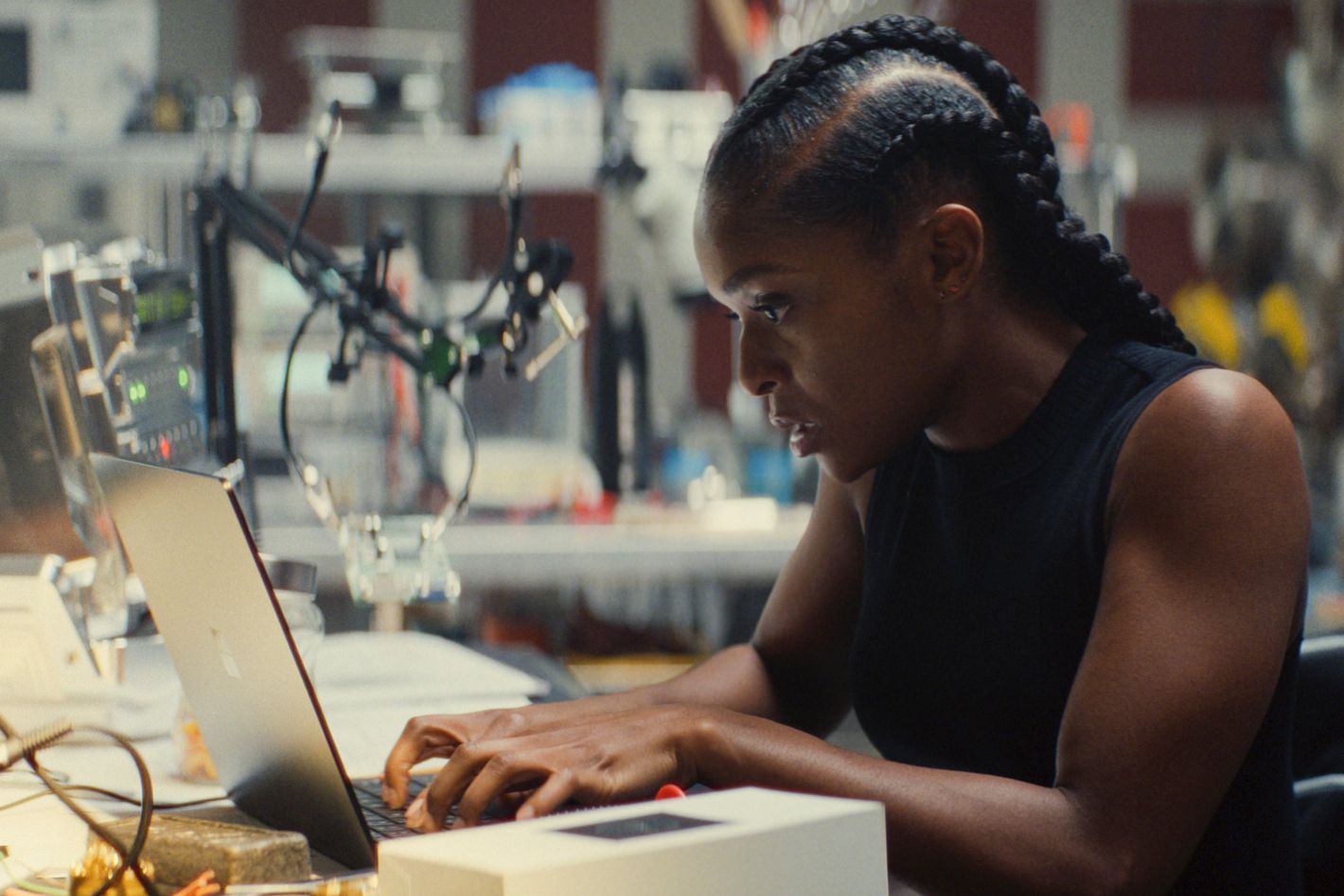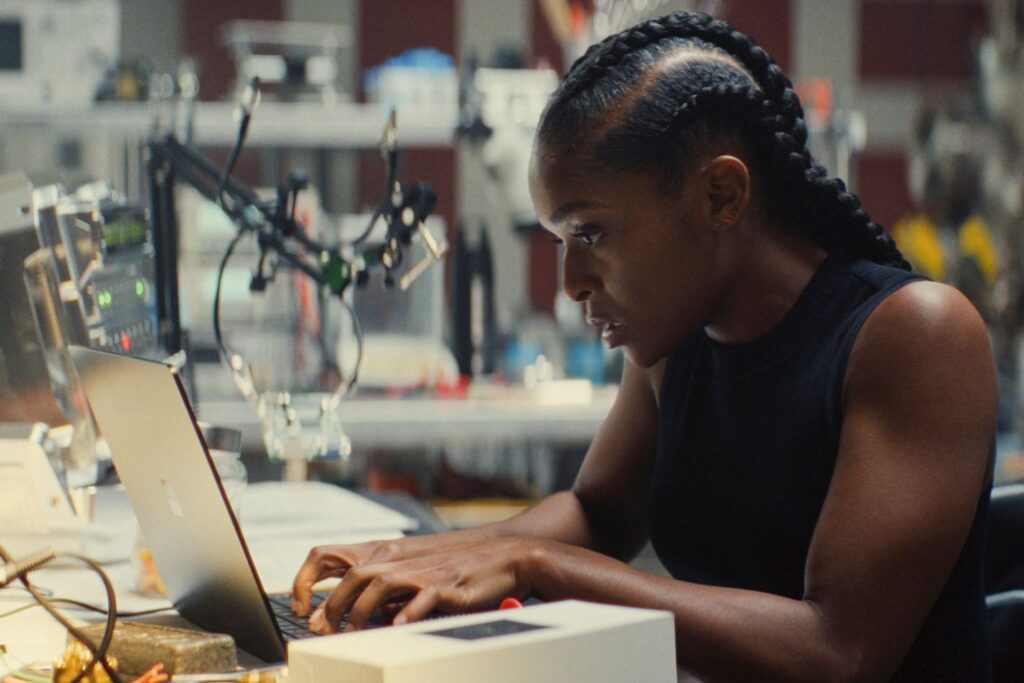
Teen tech prodigy, gearhead, and girl’s girl Riri Williams (as played by Dominique Thorne) first appeared onscreen in 2022’s Black Panther: Wakanda Forever. Ironheart takes place after Riri visits Wakanda, where her patented vibranium detector helped Shuri defeat the underwater kingdom of Talokan, and after the death of Tony Stark, whom we’ll hear referenced way too often in this pilot, given that Riri’s strongest connection to Stark in this series is her preoccupation with building iron suits. In Wakanda Forever, Riri was a breath of fresh air, playing the awed but capable tourist in a grieving, technologically advanced nation. In Ironheart, we meet her while she’s grieving a major loss herself. Because of the way that grief has altered her, it feels as if we’re meeting her for the first time.
At present, Riri is listless, working and scamming her way around MIT’s campus. One of Riri’s professors poses to a class she’s sneaking into late, “Do you think Tony Stark would be Tony Stark if he wasn’t a millionaire?” Riri already knows the answer to that. She’s selling assignments to a series of students to self-fund her research. Her in-development iron suit and its AI prototype cost millions of dollars she doesn’t have. Working on that level of innovation doesn’t come without risks; we watch one of her suits’ parts ignite and cause a teeny-tiny bit of lab damage.
Riri asks her dean for a one-year extension on her grant — with more time, she could perfect her iron-suit technology to revolutionize first-response and emergency units. But Dean Choi points out that after four years of faculty-tailored course studies, millions of dollars in tech, and free education, all Riri has to show is a lousy lab-repair invoice and disciplinary infractions.
Dean Choi drops the hammer: Riri is expelled. Thorne’s acting here is pretty great; the fact that Riri didn’t even consider expulsion as a possibility is written all over her face. Riri lacks self-awareness, and she’s especially clueless in situations where she can coast on being brilliant. Clearly, she’s not used to being called out on her character flaws.
Back in the research lab, Riri is allowed to take her iron suit with her as she is escorted off campus since she built it with her own grant funding. Still, when Riri soars away from MIT and tries to activate her suit’s AI communication system, TRVOR, it refuses to follow her commands without her school ID. She grudgingly gives her credentials before instructing TRVOR to take her home to Chicago. Riri loses cabin pressure as she’s zipping through the air. It turns out that MIT’s student-services department has worked overtime to deactivate her student ID. She’s just minutes from home, but TRVOR can no longer help her get there. A Doomsday Guy who was warning that “Thanos was just the beginning!” further laments, “Tony can’t save us this time!,” and as Riri crash-lands in the middle of a street, I’m already hoping we soon reach our maximum expository reminders that we’re in the Post-Snap era and Tony Stark is dead.
Riri’s post-expulsion walk of shame gives us a tour of Black-owned businesses, including the historic Regal Theater (which lets us know we’re in the Bronzeville neighborhood on Chicago’s South Side). A few women ask if Riri’s okay after her crash. A voice tests out a few catcalls in the distance: Iron Girl, Iron Ma, and Iron Chick. (For my money, Iron Ma has some potential.) Bronzeville is a world apart from MIT; it’s a place where Riri is “seen.” Her neighbors, family, and friends can clock her distress, disarray, and disrepair in ways her peers and professors at MIT seemed to overlook.
Back at home, Riri’s mom, Ronnie, is hanging out with two of her girlfriends and discussing Riri’s recent problematic behavior. Ronnie’s friend Madeline (played by the incomparable Cree Summer) points out that many kids act out after traumatic events. As it turns out, Riri lost both her best friend, Natalie, and her stepfather, Gary, five years ago. Natalie was the same girl from the episode’s opening flashback, in which Riri and Natalie were little girls sharing their dreams. (Riri wanted to surpass Tony Stark, while Natalie wanted one night with Thor and his hammer to achieve ultimate happiness. Even back then, Natalie was already a vibe.) When Riri steps into the room, her mother is surprised she’s home already — but not surprised about her expulsion, which she learned about from an MIT janitor whom she bribed to give her updates on Riri when she first enrolled there.
When her friend Xavier interrupts their reunion and invites Riri out, she seizes the opportunity to escape from Ronnie and her maternal worries. It turns out Xavier got Riri out of the house to show her a neighborhood mural dedicated to Gary and Natalie, who’s Xavier’s little sister. They also hit up a scrap exchange where Riri’s been a regular for years, but since she’s broke, she’s hoping the owner will let her buy parts on credit.
This is where Riri’s story intersects with the Hood’s (Anthony Ramos). Earlier in the episode, a heist crew nearly ruins a home invasion when its tech expert, Stuart (played by Eric André), accidentally triggers an alarm. After the crew returns to its drop-off point and informs Parker — or “Hood” — about the job, Parker meets with his cousin John (Manny Montana), the crew’s logistics head, and they agree that Stuart has to be replaced by someone more competent.
So John steps in and pays for Riri’s pile of parts in cash. Montana is bringing the same “Get in the car, Elizabeth” energy he brought to his role in NBC’s Good Girls, and if this is how Hollywood chooses to typecast him for a few more years, I will not be mad. John tells Riri she’s too smart to be haggling for trash and offers her a job with Parker. She can’t resist the promise of a possible high-paying gig, so she shows up the next day at the agreed-upon spot, only to find herself entering an elevator that locks her in. When she bangs on a wall panel, it falls to reveal a bomb clock now ticking down from three minutes. Gas hisses into the elevator car, and Riri rips back the tarp in the corner to unveil her new job’s welcome packet: a device with a Post-it slapped on top with her name and a smiley face scrawled in Sharpie. BFFR, HR team.
“What is this?” Riri demands. “Your interview,” Parker answers, and I’m not sure I like the Duh I hear in his voice.
The heist crew is huddled around a monitor, watching the digital gang initiation unfold. They’re unimpressed with Riri’s approach until she abandons the device on the floor, heads over to the clock, and uses two of its wires to restart the elevator car’s ascent. They all agree that Eric André’s pink slip will be in the mail.
Once Riri crowbars herself free, Parker makes his pitch: When Riri gets tired of being broke and underestimated, she should come work for him. She offers a soft refusal until he cracks open a briefcase full of bands. Well … maybe extortion, theft, and breaking and entering aren’t deal-breakers for her. She agrees to join his crew as long as she won’t be hurting anyone. He’s like, “Just bring the suit.”
Easier said than done. Riri has a ton of postcrash repair work to do to get the iron suit functional again. While she works well into the night, she listens to a mixtape Xavier gave her earlier. It’s his own music, and she’s impressed … until she hears a recording of Natalie mixed into the melody. It triggers a flashback of the night Gary and Natalie died. They were working on the car in the same garage she is standing in when they were killed in a drive-by shooting.
This scene really drives home how she lost her support system — the two people who knew her best, the two ends of the dial on her moral compass — in a split second. Riri has a serious case of survivor’s guilt, and it throws everything we’ve just watched into stark (no pun intended) relief. Her flippant attitude toward school, her refusal to talk through her grief, and her slippery grasp on the concepts of right and wrong can all be traced to that fateful night in this garage.
Over a soundtrack of Nina Simone’s “Sinnerman,” Riri throws herself back into her work, attaching sensors to her temples and programming her iron suit’s rebuild. Across town, John adds ink to an intricate tattoo on Parker’s back. Parker is in pain, and John is worried about that, but perhaps the most important takeaway at the moment is that Anthony Ramos is ripped.
Riri has dozed off in front of the monitor, but the good news is that the system’s fully uploaded. She hears her name being called and rouses, thinking it’s her mother. When she opens her eyes, she sees that it’s someone else she loves. Riri’s completely shook as she stares at the glitchy, holographic image in front of her. “… N-Natalie?” Natalie cements herself as my new favorite character in the series when she answers, “Well … who the hell else would it be, bish?” An icon, a legend, the moment.
Riri Williams might have helped save Wakanda, but back home she’s still a genius college dropout grieving a lost loved one.
































































